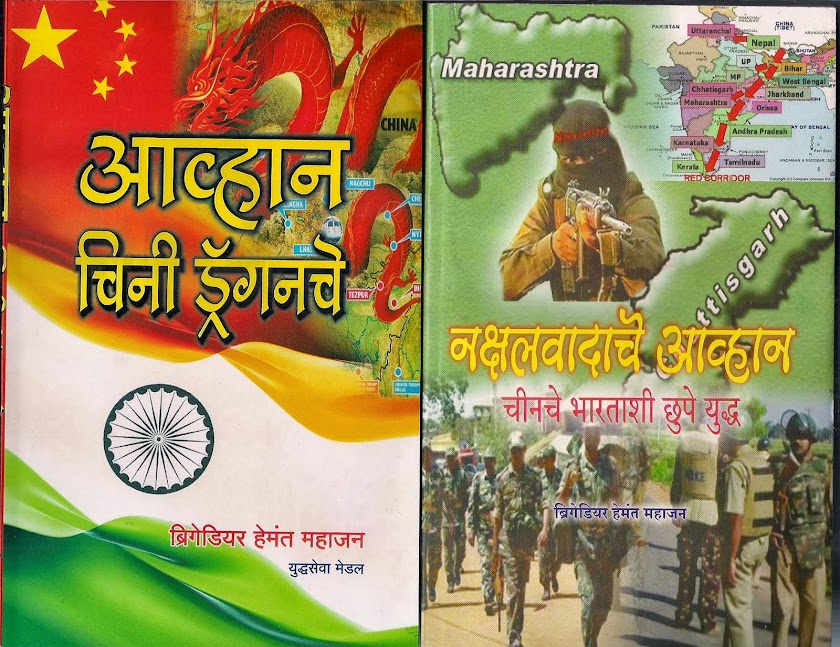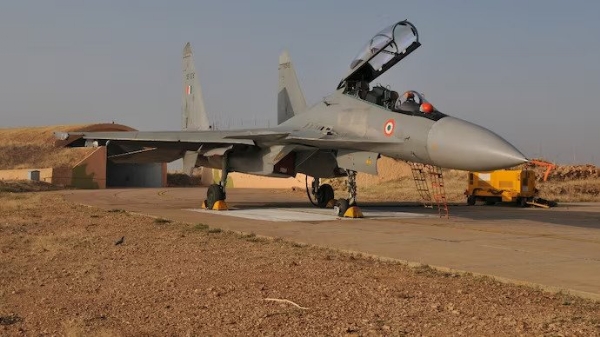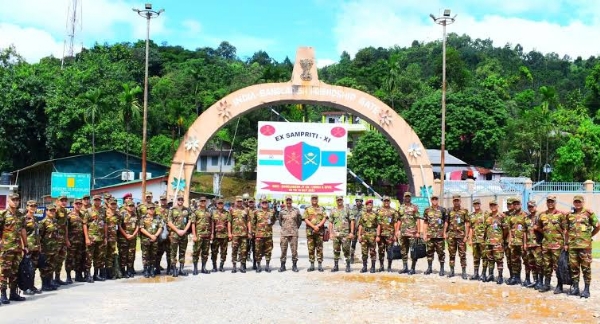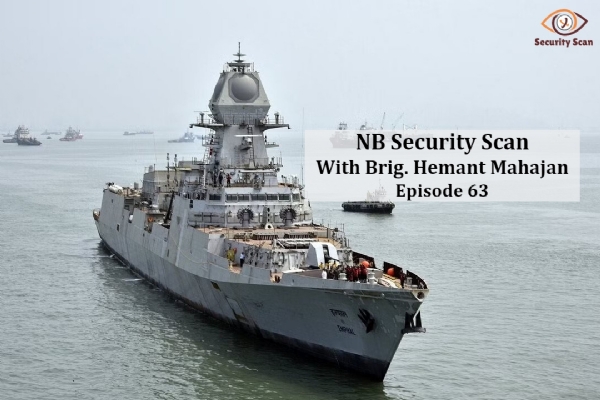
SPREAD MESSAGE OF INDIAN NATIONAL SECURITY TO AS MANY INDIANS AS POSSIBLE. LET US FREE INDIA OF CORRUPTION BY SPREADING THE MESSAGE TO AS MANY PEOPLE.MANY OF THE ARTICLES HAVE BEEN RECEIVED AS FORWARDED MAIL FROM VARIOUS FRIENDS . SHOULD SOME FACTS BE NOT CORRECT , YOU ARE REQUESTED TO PUT IT IN REMARKS BELOW THE ARTICLE. THIS WILL ENSURE A MORE BALANCED PERSPECTIVE OF THE SUBJECT DISCUSSED.
Total Pageviews
Tuesday 31 October 2023
Sunday 29 October 2023
Saturday 28 October 2023
Friday 27 October 2023
EXTERNAL AND INTERNAL SECURITY CHALLENGES IN INDIA WEEK ENDING 24 OCT 23
India plans to equip Russian-origin Su-30MKIs with indigenous 'Virupaaksha' radar

Crypto's role in terrorist financing
Deceased Agniveer's family to get over Rs 1 crore financial assistance: Indian Army
Focus on SPV model to manufacture fighters, tanks, copters, missiles
5-day Army commanders' conference gets underway
Canada says no sign India tensions are impacting military ties
Defence Ministry signs contract worth Rs 2,310 cr with Mazagon Dock for training ship
Eleventh edition of SAMPRITI-XI bilateral military exercise takes place between India & Bangladesh

India a significant hub where we design products for global markets, will double by 2027: Thales CEO
Pakistan a Failed State Targeted Killings Of Designated Terrorists By Unknown Assailants In Pakistan
Pakistan a Failed State
Targeted Killings Of Designated Terrorists By Unknown Assailants In Pakistan

External Security & Internal Security
After Ladakh, Indian Army plans to deploy fast boats, landing craft at other border areas
Indian Navy gets its third stealth destroyer
Thursday 26 October 2023
#SecurityScan 63: Indian Navy gets its third stealth destroyer, Israel-Hamas War & much more
https://www.newsbharati.com/Encyc/2023/10/25/Security-Scan-63.html
Targeted Killings Of Designated Terrorists By Unknown Assailants In Pakistan

Wednesday 25 October 2023
Friday 20 October 2023
Monday 16 October 2023
Sunday 15 October 2023
Israel and Hamas Latest Conflict: A Sad Dilemma-Part 2- Gen Nitin Gadkari
Shifting US Concerns
The Biden administration suffered from foreign
policy failures in Afghanistan, China, and Russia. The Ukraine conflict became
the epicentre of US attention. With the Middle East relatively quiet and
peaceful, the US was keen to get out and concentrate on its problems in Ukraine
and the Indo-Pacific. As a foreign policy, the Biden administration was eager
to see Israel reduce its conflict with the Arab world so that the US could
disengage from the Middle East and concentrate on the newer areas of concern
borne out of the belligerence of Russia in Ukraine and China in the south China
sea. The Abraham Accord came to the rescue, and for the US, it was time to put
part II into motion. The mutual hatred for Iran made the common ground for
Israel's Prime Minister, Mr Netanyahu, and MBS to tread on. Serious discussions
brokered by the US brought the two sides within striking distance of inking a
deal. But while the deal was a win-win for all parties, it was not easy for the
Saudis to give their nod till Israel made some serious concessions on
Palestine. MBS and the Sauds, though dictators are very sensitive to public
opinion at home. Any Arab deal without the Palestinian bargain would be
disastrous. It is believed that the staunch conservative right-wing Prime
Minister Mr Netanyahu was considering something which would have been a bargain
enough for the Peace deal between the Saudis and Israel. The speculated part of
this deal was the military support by the US to the Saudis and the permission
and active help to build a civil nuclear facility inside Saudi Arabia. Despite
much opposition inside the US, the Biden administration was willing to let this
deal go through with ironclad guarantees from the Saudis, which were necessary
to appease the Israelis. It was believed that the deal was in the final
stages of its draft, being readied for the signatures of the two Heads of State
at an early date.
The reality of a deal like this to go through
meant one country would be the biggest loser. The country was Iran. A
nuclear-capable Saudi Arabia was a direct challenge to the Iranian dreams of
the leadership of the Islamic world and a diplomatic victory for its arch-rival
Israel. Iran has been funding the Hamas (a Sunni group) in Gaza and Hezbollah
in Lebanon for years. Although the Shias hate Sunnis and Vice versa, their
hatred for the State of Israel is greater than their mutual hatred. It would be
logical to think that Iran would have liked to scuttle the deal between Israel
and Saudi Arabia. Hamas, on the other hand, harbours a pathological hatred for
the Zionist state of Israel and has vowed to kill all Jews and abolish the
state of Israel. Hamas's agenda is first the extermination of Jews and then the
rights of the Palestinian people. Such ideological blindness is easy prey for
exploitation.
The Hamas Offensive
All the compounds that make an explosive
mixture in the Middle East were boiling in this cauldron for a while. The
events of the past, like the storming of the Al-Aqsa mosque in east Jerusalem
in the holy month of Ramzan by the Israeli police and the killings of the
Palestinians in the West Bank last year, were a component of this explosive
compound, which was ready to explode anytime. Why Israelis were complicit in
this understanding or complicit in the preparations of Hamas for an attack on
Israel is baffling. The common belief that fits the narrative is that Israeli
intelligence and the military were too arrogant to believe that Hamas could
launch an attack on Israeli soil. The well-coordinated attack on the 07th of
October 2023 near the southern border of Israel would have taken months, if not
years, to plan. Hamas does not have the capability the Israelis believed, which
could be true. This understanding gives credence to the theory that Hamas had
outside support regarding the finances, sophisticated weaponry, and planning
for this foray into Israel. The method used and the coordinated targeting of
surveillance systems at the points of incursions required an experienced
military mind to plan precision attacks. It took Israel and the entire Western
world by surprise. It does not need rocket science to guess where such help
could have come from for Hamas.
Prognosis
Israel has not yet begun the ground offensive.
It is expected anytime soon. What the objectives are and what the terminal end
state would be as desired by the IDF (Israeli Defence Forces) is a matter of
conjecture. Yet, going by experience ( Read the two articles written on this
blog in May 2021 on the last Israel-Hamas conflict; the link below), the IDF is
unlikely to achieve substantive gains. It is tough to distinguish who is a
Hamas activist and a civilian, as all Palestinians look alike, and Hamas does
not operate as a regular army outfit. They act as a terrorist group in cells
independent of others. Second, Gaza is a very densely populated area. Making
way through the debris and destruction, laden with booby traps and mines, would
slow the operations to a snail's pace. Suppose the objective is to liberate the
captured Israeli civilians and army personnel. In that case, it's impossible
for the IDF to achieve unless the Hamas release them as part of a deal or a
concession to the IDF. Hamas does not operate from overground centres or
structures. They have developed a sophisticated system of underground tunnel
cris-crossing at varying levels (depth), making access to it or its destruction
very difficult. Hamas is allegedly holding these hostages in a few of these
tunnels.
Israel and Hamas Latest Conflict: A Sad Dilemma-part 1 -Gen Nitin Gadkari
To write anything about the ongoing Israel-Hamas conflict is fraught with the danger of boring a reader with another news bulletin. They fly fast and thick in every form, most on the WA and other social media. They are all opinionated and take sides. So another one for you to read would mean I am treading on dangerous grounds. That is why I tried to avoid the conflict and look at the broader scenario of how the conflict is built up. This piece is the first in the series, and there would be at least another if the conflict resolution is quick. But going by the turn of events, it’s unlikely. This time, the end state may be quite different than envisaged or what has been achieved earlier. What would it be? It is very hard to predict. I suspect even the Israelis are unaware of how this would end. For the region's sake, I hope that good sense prevails over the political leaders to rein in their respective militant or murderous elements. No one side alone can find a solution to this complex problem. I hope you find something new in this read.
Israel and Hamas Latest Conflict: A Sad Dilemma
With the amount of information circulated by the print, electronic media, and on the internet, there is very little that a reader doesn't know about the history, geography and the reasons for the current war. If anything, there is an information overload. It is difficult to separate the Chaff from the grain. Seventh day after Hamas made a daring intrusion onto Israeli territory, most observers are baffled: How could it happen? Many theories are doing the round. For example, the Egyptians had warned the Israelis about a big impending attack by Hamas at least three days before the attacks happened, or a cyber-attack paralysed the Israeli electronic systems, thus making them blind to the actual incursions. There may be little truth in them. A billion-dollar fence does not collapse without reason or because of the day's cyber-attack. Yet there is a sinister feeling about how the entire first day of the crisis fanned out. Israelis have responded by bombing Gaza to earth. The air and artillery strikes continue even as this article is being written or read. The anticipated Israeli ground offensive is to be launched anytime. Having slipped up in allowing this deadly Hamas attack, the Israeli government now vows to kill every Hamas member. 'This time it would be different', they have promised to their Public. Such a promise is a tall order. This is not the first time Israel has vowed to obliterate Hamas, and it will not be the last time if things don't change.
There is something sinister about this crisis. The signs are different than the usual Israel-Palestine, Israel-Hamas conflict. Israel has fought with Hamas since it seized power in the Gaza Strip. In 2007, 2012, 2014, 2018, 2021 and now 2023. This time, the level is different, both the Hamas attack and the Israeli response from the air. The genocide of the Israeli civilians in their territory on such a large scale is a new low for the Israelis. Why is this conflict giving chills to all governments in the world? As if the evil has risen from the ground and a biblical prophecy of holocaust is coming true. Will the conflict widen and engulf more nations? This article delves into what makes this conflict different. And is there more than what meets the eye?
The Abraham Accord
In September 2020, Israel, Bahrain and the UAE signed a peace treaty. It formally established diplomatic relations between the UAE, Bahrain, and the Israelis. It meant two important Arab countries had recognised the state of Israel and established diplomatic ties. Signed under the umbrella of the Trump administration, it was hailed as a successful Coup, which the Trump Administration had pulled out in its dying days. It was named the 'Abraham Accord'. Central to this treaty was the role of Saudi Arabia. Both Bahrain and UAE are strong allies of the Saudis. It was believed that Saudi Arabia had given its tacit approval to these countries to go ahead with the accord, thus opening up the Middle East to a new period where business with Israel was not taboo.
Why was this accord so significant? The answer to this question goes back to the formation of the Jewish land in 1949 by the United Nations out of Palestine. The Arab land of Palestine was divided, and Israel was carved out of it. Ever since then, the Arab countries have vowed not to recognise Israel and do any business with them. The central understanding was any reconciliation with Israel would only be after the state of Palestine got a de Jure recognition as an independent country. This recognition was of the 'Two State Theory' of Palestine. Since Israel did not recognise Palestine as an independent country, the Vice versa was also true for the Islamic world. When the Abraham Accord was signed, It broke the 70-year-old understanding between Islamic nations. The Abraham Accord had no mention of Palestine.
The Saudis behind this development drew the ire of the Islamic world, much to the delight of the Iranians. Saudi Arabia under Mohammad-Bin -Salman (MBS in Short) is on the cusp of a change. Saudi Arabia is the claimers to the title of "‘Protecters of the Islamic Ummah’ (Islamic holy community). Their claims are recognised because they are the custodians of the two holiest shrines of the Islamic world, Mecca & Medina. Both cities are in Saudi Arabia. Yet there is a divide in Islam: the Sunnis, a sect to which Saudi Arabia belongs, and Shiites (pronounced as Shias). The Shias find their leadership in Iran. The divide between the two Islamic sects is due to the conflict about who is the real successor of Prophet Mohammad. The divide between the two sects is bitter; thus, the divide between the two nations leading the sects is also very bitter. Both countries claim to be the leaders of the Muslim world.
When the Abraham Accord was signed, there was a tacit understanding that it would pave the way to a similar accord between Saudi Arabia and Israel. President Trump and his Republican party lost elections in the US, and the Saudi-Israel deal went into cold storage. President Biden wanted to resurrect the nuclear deal with Iran, which his party under Barrack Obama had made. Also, the Khashoggi murder, a Washington Post journalist allegedly murdered by the Saudi secret service in the Saudi Consulate in Istanbul, Turkey, had left President Biden a bitter critic of MBS. He had vowed to make Saudi Arabia a pariah state. He was more inclined to appease the Iranians.
ISRAEL-PALESTINE DISPUTE : IS THERE A WAY OUT? LT GEN GAUTAM MURTHY
ISRAEL-PALESTINE DISPUTE : IS THERE A WAY OUT?
As the whole world heaves a sigh of relief, albeit with fingers crossed, with the Egyptian brokered ceasefire coming into effect at 2 am on Friday 21 May 2021, and ending the devastating 11 day conflict, that saw more than 240 fatalities most of them civilian, the question uppermost on everyone’s mind is if this respite is enough to see a permanent truce and the end to the conflict. The conundrum and the antagonism that has led to this dispute is the unshakeable belief by both the Israelis and the Palestinians that they are the rightful owners of the lands on which and for which they are fighting.
Without going into the genesis of the dispute it is worth recollecting that much headway has been made on the path to peace, keeping in mind that situation in 1948. Starting with the first Camp David Accord in 1978 between Israel and Egypt which resulted in Egypt granting full recognition to the State of Israel in return for the Sinai Peninsula to the Abraham Accords of 2020, much water has flown under the bridge. In between, the Oslo Accord of 1993, resulting in the much publicised Camp David Accord of 1993 promised a two state solution which at the last minute failed mainly on the ground that Israel refused the right to return of all displaced Palestinians.
With most Arab countries grudgingly accepting the existence of the State of Israel, (with back channel diplomacy active to get Saudi Arabia too on board), the main parties in the dispute, besides the Israelis and the Palestinians are the Iranians. Iran is implacably hostile to Israel and to a large extent to Saudi Arabia too. Iran is known to fund and support Hamas in the same way as it funds and supports the Hezbollah in Lebanon. Violence has been the rule rather than the exception since the first ‘intifada’ in 1987 with brief lulls in between. So is there a solution to end this never ending cycle of violence? There possibly is and it is perhaps as ‘out of the box’ as it can get.
Briefly, before the 1967 war, the West Bank was a part of the Kingdom of Jordan from 1948 onwards. Jordan eventually relinquished all claims on the West Bank in 1988 and even deprived the Palestinians of their Jordanian citizenship. The Gaza strip has had a more convoluted history and was occupied by Egypt till 1967 when it was captured along with the Sinai Peninsula by Israel. Subsequently as a result of the Israel-Egypt Peace Accord, Egypt relinquished all claims on Gaza, agreed to keep the Sinai Peninsula de-militarised and created a small buffer zone between it and the southern border of Gaza. In 1994, as a result of the Oslo Accords, Gaza came under the control of the Palestinian Authority. Since 2007 however, it is completely under control of the Hamas which views the Palestinian Authority now called Fatah with contempt and is implacably opposed to it. In 2005, Israel withdrew unilaterally from Gaza, its military as well as its settlements. After ousting the Fatah, the Hamas took complete control in 2007.
The situation today is that the Palestinians remain hopeful of regaining the West Bank without Israeli settlements and of restoration of peace in the Gaza strip with the ultimate aim of the establishment of a full fledged Palestinian State. For this to happen albeit with Israel’s grudging acceptance, a new paradigm has to evolve. Having the same belligerents talking to each other again through well meaning intermediaries is not going to yield any result. All that will come of it will be more of the same.
Hence, as a forerunner to an eventual Palestinian state, given the current impasse’, and to forestall further bloodshed, there exists a strong case for Jordan to reclaim the West Bank and for Egypt to reclaim the Gaza strip with of course, Palestinian assent. Both Jordan and Egypt have good diplomatic relations with Israel. Both countries have the trust of the Palestinians. If they are sovereign owners of the land, their locus standi improves vastly compared to them being just honest brokers. Their ownership and control of the territories will bestow upon them the necessary authority to deal with Israel on equal terms and not as supplicants as is happening now with the Fatah. Once these lands become their sovereign territories, the issue of settlements on the West Bank can be taken up by and by. It must be reiterated that Israel withdrew its settlements in Gaza. The issue of settlements in the West Bank is not set in stone. The Hamas on the Gaza strip can be de-fanged.
Such a proposal it is felt would have the backing of all Arab countries. Iran too can be brought on board. Without Iran’s support, the Hamas cannot be the disruptive force that it is today. Subsequently after peace is established, both Jordan and Egypt can relinquish their claims on the West Bank and Gaza respectively to pave the way for the establishment of a full fledged sovereign Palestine. This idea may seem harebrained at first. It is however predicated on the fact that the belligerents want a just and durable peace with an end to violence and the desire for wanting peace is not as harebrained as remaining in a perpetual state of conflict and suffering.